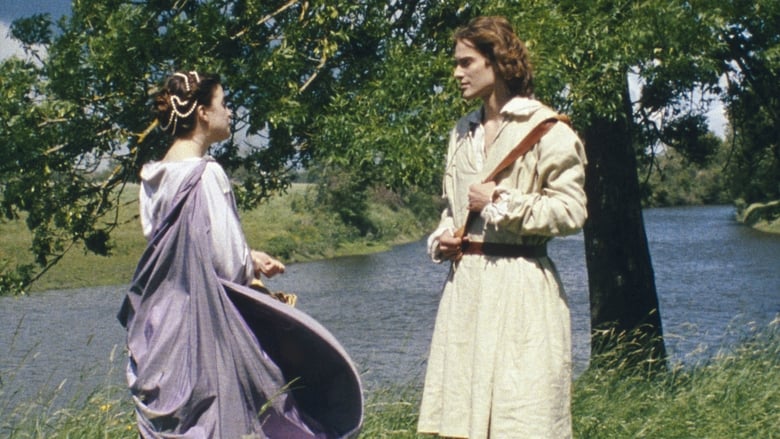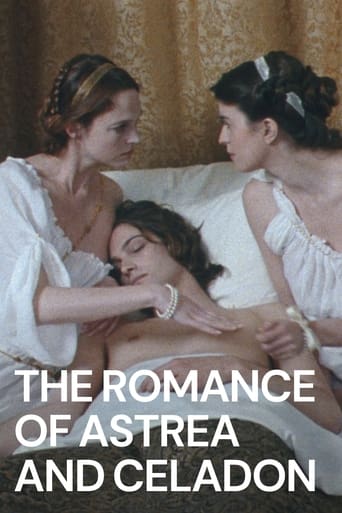The Romance of Astrea and Celadon (2007)
In an enchanted forest, back in the time of the Druids, the shepherd Céladon and the shepherdess Astrée share a pure and chaste love. Fooled by a suitor, Astrée dismisses Céladon, who throws himself into a river out of despair. She thinks he's dead, but he's been secretly rescued by some nymphs. Faithful to the promise he made to Astrée to never appear before her again, Céladon must overcome many obstacles to break the curse. Mad with love and despair, coveted by the nymphs, surrounded by rivals, and obliged to disguise himself as a woman to be near the one he loves, will he manage to make himself known without breaking his oath? A romance filled with doubt, hazards, and delicious temptations.
Watch Trailer
Free Trial Channels
Cast


Reviews
Overrated
It's no definitive masterpiece but it's damn close.
One of those movie experiences that is so good it makes you realize you've been grading everything else on a curve.
Mostly, the movie is committed to the value of a good time.
This movie is based on a 1610 French novel which takes place in fifth-century Gaul. The story is about the title lovers, children of two feuding families, and at a festival, Celadon tries to hide the romance by pretending to be in love with another girl. Though it was for show, Astrea assumes Celadon's infidelity was genuine and tells him she never wants to see him again, though he threatens to drown himself...and jumps into the river to do so.This causes distress to both the villagers, especially Astrea...but they are unaware that he had been rescued by three nymphs who take him to their castle. One nymph wants Celadon for himself, but another manages to smuggle him out and have him live in the forest, with her druid father coming to help him. But Celadon won't go home because Astrea ordered her not to see him. The rest of the movie revolves around getting Astrea and Celadon back together, which is much more time-consuming than it should be.The movie is full of elements that hardly evoke what fifth-century Gaul must have been like, including a castle and garden that must have dated from at least a millennium later, overly-refined statuary and writing and such, and the discussions of love and religion have little relevance to the overall story. Worst of all, however, is that the two lovers could have gotten back together without having had to resort to all the rigmarole-hence my review title.
Raymond Radiguet concluded his novel "Count d' Orgel's Ball" in a masterly manner with the count's terrible phrase: And now, sleep, Mahaut, I want it so - mesmerizing his love into blackmail.What this has to do with Rohmer's pastoral romance? Its histrionics could not be more far than Rohmer's world. I take it as a perfect contrast to the film's end: young Astree cheerfully chirps to the exposed, from his previous cross-dressed role as a druid's sick daughter, Celadon: Vives! Vives! Je te le commande! which translates into something like: Live! Live! I order you so! This "into something like" has its own whimsical twist that makes me wonder about the extent of Rohmer's deliberate irony (and mine): Astree, or rather the actress portraying her, seems to me the more naive of the whole cast, and the more debatable on technical skills. I mean the troubadour, or rather a mockery of this, with his shrill voice, does not offend me as over-the-top in his performance, although he is a bit obvious. He is there for, in a way, us throwing darts to him. Perhaps Rohmer's mockery turned a bit harsh on him; one wonders if this was the case for Astree. It makes me think of Kubrick's sly choices of leading men in his films: the actors' public image as exemplary cases of somewhat ridiculous virility, in Kubrick's hands turned into the films' advantage.Of course this sadistic strain does not occur in Rohmer, far from it. So, why do I mention this? Here comes the punchline: because Astree's articulation is so blurred, her acting so bad and fresh, that the first time I heard the film's final sentence I thought, astonished and confused, that she was saying "Je telecommande!" that is, literally, "I TV order".Was this Rohmer's last word? For even if I cannot argue that wordplay is something he pursued in his films (although the early short "The Monceau bakery girl" features the amorous homonymy "ca me dit/samedi" in the flirting exchange "Ca vous dit?" "Oui, ca me dit." "Sortons donc Samedi." which means "It sounds okay?" "Yes, it sounds okay." "So let's go out on Saturday."), I cannot claim either that this was something he overlooked. The film in its simplicity, exemplifies an amazing level of sophistication. For to achieve such illusory simplicity, that also dares to play with our allusions of a soft-porn sensibility, or mock-philosophy (listen how the druid's discourse on trinity has the volume turned down a little, as a soft pedal occurred), well, it warrants a master's touch.I am left amused, or rather bemused, than perplexed. It is as if this doesn't actually matter, and one wouldn't want it otherwise, mesmerized away from TV, into somewhat more difficult pleasures posing as, and with pastoral simplicity; it all is spiritually uplifting.I will soon revisit - and live! - this little quick-silvery film.
Eric Rohmer's announced last film, The Romance of Astrea and Céladon, is a costumed period piece based on a 1610 novel by Honoré d'Urfé that imagines what life was like in Fifth century Gaul. It is a work of sublime physical beauty and surprising eroticism that looks both backwards and forwards in time. While it appears to be a look back at a naive and outdated way of life, it may indeed be the opposite - Rohmer's final rebuke of the spiritual emptiness of the modern world, and a preview of a new world struggling to be born. This strange dichotomy is implied by the unusual preface in which a voice announces that the story had to be moved from the Forez plain, "now disfigured by urban blight and conifer plantations, to another part of France whose scenery has retained its wild poetry and bucolic charm." Rohmer transports the viewer to a world of idyllic streams and forests where shepherds dress in the tunics of the Seventeenth century. Celadon (Andy Gillet), a young man of noble birth has chosen the simple life of a shepherd and is deeply in love with Astrea (Stephanie Crayencour), a shepherdess of more modest family lineage. Though the film in lesser hands might have seemed a bit silly, Rohmer's straightforward direction reveals an emotional truth often obscured by modern cinematic techniques of fast cuts, hand-held camera-work, and curse words that are supposed to enhance "realism.At a family gathering, Céladon pretends to be infatuated with Amynthe (Priscilla Galland) to mollify his and Astrea's parents who are bickering, but when Astrea sees him kiss the other woman, she is racked by jealousy and orders Celadon to stay away from her forever "unless I bid you otherwise". In despair, Céladon says "I'll drown myself, at once" and proceeds to jump into the river at once, but is rescued before drowning by the nymph Galathea (Veronique Reymond) who brings him to her castle and, with the support of two other nymphs, nurses him back to health.When Galathea discovers how attractive he is, however, she wants Céladon for her own pleasure and forbids him to leave the castle but, in the film's first instance of cross-dressing (a notorious Shakespearean plot device), he is smuggled out by another nymph, Leonide (Cecile Cassel) and hides out in the woods. Astrea believes Céladon to be dead and with some regret, forgives him and loves him more than ever, though Céladon refuses to see her out of respect for her word. He begins to rethink his position, however, after being visited by a druid priest (Serge Renko) who hatches a secret scheme to reunite the two lovers.The Romance of Astrea and Céladon is filled with a lightness that is absent from Rohmer's more talky Six Moral Tales and later films in which the characters pontificate at length on the ins and outs of romantic love. His philosophical (and Catholic) bent surfaces, however, in a scene in which Hylas (Rodolphe Pauly), a jester, who is regarded with complete disdain by others, berates the follies of indiscriminate sexuality while Lycidas (Jocelyn Quivrin) promotes love as an ideal that merges two souls into one and the film's robust final sequence demonstrates the extremes one may go to for love.In The Romance of Astrea and Céladon, Rohmer, now in his 87th year, promotes the ideals of commitment, the integrity of one's word, and the poetry of romantic love without its modern day clatter. While these ideals may not seem terribly exciting (one film critic wrote that, "maybe humankind ditched romantic fidelity because it isn't exciting!"), they act to ground us in our noblest aspirations, to remind us of what it means to be human, a task that, in his six decades of film-making, Rohmer has exquisitely accomplished and which The Romance of Astrea and Céladon places a final exclamation point.
Canadians are too polite to boo but the audience at the Toronto Film Festival left the theater muttering that they would rate this film 0 or 1 on their voting sheets. The premise is that a modern filmmaker is interpreting a 17th century fable about the loves of shepherds and shepherdesses set in the distant past when Druids were the spiritual leaders. Working in three epochs presents many opportunities to introduce anachronisms including silly and impractical clothing and peculiar spiritual rites that involve really bad poetry. Lovers are divided by jealousy and their rigid adherence to idiotic codes of conduct from which cross-dressing and assorted farcical situations arise. The film could have been hilarious as a Monty Python piece, which it too closely resembles, but Rohmer's effort falls very flat. The audience laughed at the sight jokes but otherwise bemoaned the slow pace. The ending comes all in a rush and is truly awful. This is a trivial film and a waste of your movie going time.








